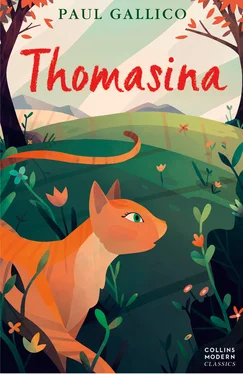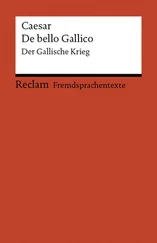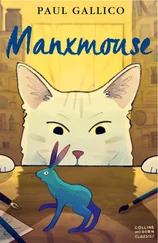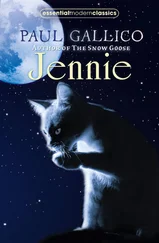Mary Ruadh then was six years old, going on for seven, and we lived in the last house but one near the end of Argyll Lane. Our next-door neighbour was Mr MacDhui’s friend, Mr Angus Peddie, the minister, who kept a most disgusting pug dog by the name of Fin. Ugh!
Our house was really two houses, one next the other but separated and they were of white-washed stone with slate roofs; they were rather long and narrow; two storeys high, with tall chimneys at each end on which there was usually perched a seagull. In one of these we lived and in the adjoining one was the office, waiting-room, surgery and hospital of Mr MacDhui. But, of course, we never went there for Mary Ruadh was forbidden to do so. After what had happened in Glasgow, Mr MacDhui had sworn he would never again have sick animals in the place where he lived.
I considered myself a good deal better off in Inveranoch than in Glasgow because Loch Fyne was an arm of the sea that pushed up from the ocean down by Greenock right up into the Highlands as far as Cairndow and brought with it gulls to watch in flight and the smell of the sea and fish and queer birds to chase that ran along the beach behind which lay a wonderful dark and scary country of woods and glens and mountains of stone in which to hunt. I was never allowed out in Glasgow, but it was quite different here and soon I became a real Highlander and we Highlanders, of course, looked down on everyone else.
Inveranoch was not as large a city as Glasgow, in fact, it was quite small with no more than a few thousand inhabitants, but to make up for that hundreds of visitors came there every summer for their holidays.
This was the busiest time for Mr MacDhui for the guests often brought their pets with them, mostly dogs, of course, but sometimes cats and birds, and once, a monkey, and the climate did not always agree with them or they would get themselves bitten or stung in the woods, or pick a fight with one of us Highlanders, which was foolish since they were much too soft and then their owners would have to bring them to Mr MacDhui for repairs. He seemed to take this in very ill part, for he was a man who hated pets and disliked being a veterinary and preferred to pass his time in the back country with the farmers and crofters rather than keep office hours.
However, none of this was any of my concern and I was fairly comfortable at this time and living a routine sufficiently to my own taste, except for one thing. Mary Ruadh had become a cat carrier.
If you have had or have a little girl yourself you will know what I am talking about. If not, you may have noticed that, at a certain age, little girls always carry a doll around wherever they go, but some carry their cat. Often they do not even know they are carrying it as they walk or toddle about with it. They hold it around the middle, just below the shoulders, clutched to their breast so that most of the cat dangles a dead weight with head and forequarters hanging over the arm.
Mary Ruadh did vary this most uncomfortable and humiliating position sometimes by placing me across her shoulders like a fur piece where I could rest and even be admired by people who sometimes said it was difficult to tell which was Mary Ruadh’s hair and which was me. I didn’t mind that. Or she would carry me upside down in both arms, like a little baby. I hated that.
If you ask me why I put up with it, I cannot tell you, since my philosophy of life is quite simple. When you find yourself in a situation where unpleasant things, or things you don’t like, occur more frequently than pleasant ones – walk out.
Well, there were other things too, which I wasn’t going to mention, but as long as I am on the subject, I might as well. There was the being made to sit on a chair sometimes at tea with a napkin around my neck and pretend I was a person, or rather, Mary Ruadh pretended. This got me a few caraway seed cakes of which I happened to be fond and a couple of laps of milk out of a saucer, but it didn’t make up for the indignity.
When I had kittens they took them away from me and drowned them.
At night I was forced to sleep at the foot of her bed. Nor could I go away to my favourite chair after she fell asleep for if she woke up and I was not there she would call for me and sob most heart-breakingly. Sometimes during the night, even when I was there, she would wake up and begin to cry softly in the darkness and murmur, “Mummy – Mummy!” for it seems she remembered her too. Then she would reach down in the darkness and wake me up and hold me to her so hard with her face buried in my flank that I could hardly breathe, and you know how we hate to be held.
She would then cry – “Oh, Thomasina, Thomasina, I love you. Don’t ever leave me.” After a little she would become more quiet and I would wash her face a little and lick the salt tears from her cheeks, which made her laugh and giggle and say – “Thomasina – you tickle ,” and soon she would go to sleep again.
And I stayed on. Believe me, if it had been a little boy I should not have done so, thank you very much. I should soon enough have run away and not come back, taken to the woods, or found someone else in town to live with, for I am perfectly capable of looking after Thomasina. Though I may look delicate, I am most resilient, have a hardy constitution and can stand almost anything. Once a boy on a bicycle ran over me. Mrs McKenzie came running out of the house screaming that I was killed and Mary Ruadh cried and carried on so that it took an hour afterwards to calm her and all that happened was that the boy fell off his bicycle and hurt himself and I got up and walked away.
Well, and then there was Mr MacDhui himself and there is plenty I could tell you about him , and none of it favourable. An animal doctor who didn’t like animals – there’s a good one. A bit too quick with the chloroform rag when people brought their sick pets to his surgery, was what they said. I’ll tell you, I wouldn’t want him treating me. Mr MacDhui was jealous of me because his daughter loved me so much, and he hated me. But what was even worse, he ignored me. Mr High-and-mighty-around-the-house. Nose in the air; whiskers bristling all the time. And the medicine smell of him. Ugh! It was the same one that came out of the hospital when you went past. When he returned home at night and bent down to kiss Mary Ruadh, his huge, bristly red face with the medicine and pipe smell would come right close to mine, since Mary Ruadh would be carrying me, and it made me feel sick.
Naturally, I annoyed him all I could, calling attention to myself by washing in front of him, taking care to be on his chair when I knew he would be wanting it, lying in doorways where he would be likely to trip over me, rubbing up against his legs and ankles, leaving hairs on his best clothes whenever I could find them and jumping up on his lap when he sat down to read the paper and making smells of my own. He did not dare to be rough with me when Mary Ruadh was in the room and so he would just pretend I was not there and then get up suddenly to go for some tobacco and dump me off his knees.
Add up all of these things and you might almost say it amounted to sufficient cause for me to move out. Yet I stayed on and was not too unhappy. I wouldn’t have admitted it to anyone else, but if the truth be known, I was rather fond of the child.
I think it could have been because, in some ways, girl children and cats are not un-alike. There is some special mystery about little girls, an attitude of knowing secret things and a contemplative and not wholly complimentary quality about the way they look at you sometimes that is often as baffling and exasperating to their elders as we are.
If you have ever lived with a girl child, you will know that quiet, infuriating retirement into some private world of their own of which they are capable, as well as that stubborn independence in the face of stupid or unreasonable demands or prohibitions. These same traits seem to annoy you in us as well. For you can no more force a cat or a girl child to do something they do not wish to do than you can compel us to love you. We have this in common, Mary Ruadh and I.
Читать дальше












